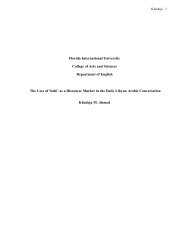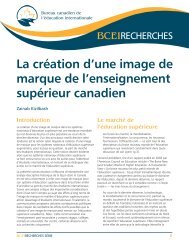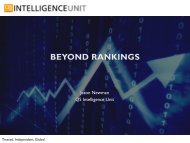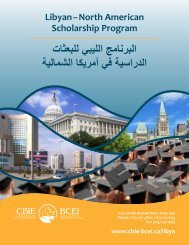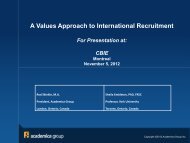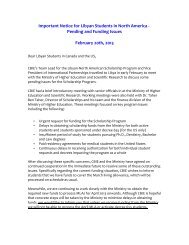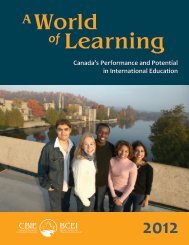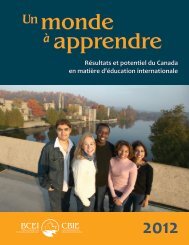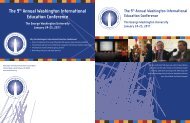Creating a New Historical Perspective: EU and the Wider World ...
Creating a New Historical Perspective: EU and the Wider World ...
Creating a New Historical Perspective: EU and the Wider World ...
Create successful ePaper yourself
Turn your PDF publications into a flip-book with our unique Google optimized e-Paper software.
Report of <strong>the</strong> Tuning Validation Panel for History<br />
The members of <strong>the</strong> validation panel would first like to emphasise <strong>the</strong> high quality<br />
of <strong>the</strong> text presented by <strong>the</strong> Subject Area Group in History. The project represents<br />
an enormous amount of high-quality work <strong>and</strong> <strong>the</strong> validation process undoubtedly<br />
concludes in confirming <strong>the</strong> very good value of <strong>the</strong> project.<br />
The panel was also charged with making comments designed to improve future versions<br />
of <strong>the</strong> text. These can be summarized in <strong>the</strong> sixteen following points:<br />
1. The document would be enhanced by taking in account <strong>the</strong> necessity<br />
throughout <strong>the</strong> text of a global history viewpoint (imposed, among o<strong>the</strong>r<br />
arguments, by <strong>the</strong> globalization of such phenomena as <strong>the</strong> recent development<br />
of <strong>the</strong> megalopolis throughout <strong>the</strong> world, or <strong>the</strong> incidence of <strong>and</strong> global<br />
response to natural catastrophes). This would involve two major consequences<br />
for <strong>the</strong> references to space <strong>and</strong> time proposed in <strong>the</strong> document:<br />
a) a greater sensitivity to <strong>the</strong> perspective of non-European centred approaches to<br />
history; b) <strong>the</strong> enlargement of <strong>the</strong> periodization offered in <strong>the</strong> document according<br />
to this global view.<br />
2. Along <strong>the</strong> same lines, <strong>the</strong> diachronical framework used in <strong>the</strong> document would be<br />
more convincing by strongly adding a spatial dimension to it.<br />
3. The text would also be streng<strong>the</strong>ned by a stronger accent on comparative – or<br />
connecting – history, including various forms of interactions like cross processes or<br />
transfers of technology.<br />
4. On <strong>the</strong> central question of identity <strong>and</strong> diversity, <strong>the</strong> validation panel suggests<br />
that <strong>the</strong>se categories (identity <strong>and</strong> diversity) should not be used as such, but<br />
should ra<strong>the</strong>r be <strong>the</strong>mselves taken as objects of historical reflection.<br />
5. This <strong>the</strong>me of <strong>the</strong> historicity of <strong>the</strong> categories of identity <strong>and</strong> diversity leads to our<br />
next point: <strong>the</strong> importance of strongly distinguishing between different scopes, or<br />
levels of approach: local, regional, national, trans national, worldwide.<br />
6. Ano<strong>the</strong>r strong recommendation of <strong>the</strong> panel concerns <strong>the</strong> twofold necessity: a) to<br />
open more clearly <strong>the</strong> text to o<strong>the</strong>r disciplinary fields: sociology, political science,<br />
political philosophy, economics; <strong>and</strong> b) to link more explicitly <strong>the</strong> field of history<br />
with <strong>the</strong> connected fields of history of science (more specifically history of economics,<br />
history of medicine, history of mechanics, history of biology) <strong>and</strong> of <strong>the</strong> history<br />
of techniques: history of statistics, history of accounting, history of computing<br />
technologies.<br />
48



